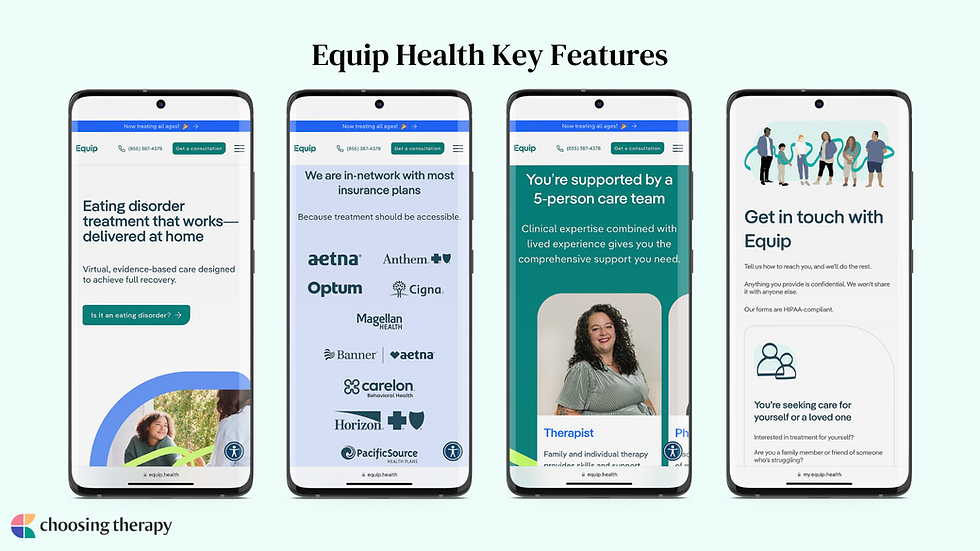Equip
- Shaurya Garg

- Jun 25, 2025
- 5 min read
Eating disorders are among the most under-treated, misunderstood, and stigmatized mental illnesses, exacerbated by fragmented systems and access to specialized care. Equip is revolutionizing eating disorder care with a fully virtual, evidence-based care model, providing care without finances, geography, or logistical barriers. This allows for a broad reach of complete care for both patients and families across the United States.
The company was founded in 2019 by Kristina Saffran, who was a patient in recovery for an eating disorder and co-founder of Project HEAL, and Dr. Erin Parks, a Clinical Psychologist and academic expert on the treatment of eating disorders. Equip has a coordinated, team-based approach to treatment, with patients being assigned to a multidisciplinary care team made up of a therapist, dietitian, medical provider, peer mentor, and family mentor. The firm offered Family-Based Treatment (FBT) for adolescents and enhanced Cognitive Behavioral Therapy (CBT-E) for adults, and started seeing patients six years and older. It operates in all 50 states and is in-network with several largest insurers including Aetna, Cigna, UnitedHealthcare, Anthem, Kaiser, Optum, Blue Cross Blue Shield, Centene, and rapidly expanding connection with multiple medicaid plans. The firm has a unique structure and is able to serve a large and diverse population, while delivering infrastructure and treatment with high engagement and clinical consistency.

Equip has experienced phenomenal growth since its launch. The company began as a 53-person team in 2021, and by mid-2025, it expanded to over 700 employees with operational staff and clinical support staff at various locations across North America, Asia, and Oceania. While the company's core services are U.S.-facing, the increased international talent footprint suggests additional international capacity is something it can grow into in the future. Equip's care model and footprint rely on scalable tech infrastructure, client-specific support technology, and tracking outcomes based on research-based measures.
So far, Equip has raised over $130 million total in multiple rounds of investment, including a $58 million Series B in late 2022 led by The Chernin Group, Tiger Global, General Catalyst, F-Prime, and Optum Ventures. The Series C investment is an additional $35 million and the investment pool now exceeds $130 million. The company has received participation from celebrity strategic advisors such as journalist Katie Couric and professional soccer player Alex Morgan. The enterprise value of Equip has a projected valuation of roughly $140 million in 2025, up to $210 million. Although the company has not publicly disclosed its profit/loss statements, analysts in the digital health industry describe the firm as a highly successful and valued “cash cow” with solid operating efficiency and dependable subscription revenues. Industry estimates based on internal and published third-party reports suggest that the company’s revenue from 2021 to 2025 has increased from approximately $4.5 million in 2021 to between $15 million and $35 million in 2025. The profit potential is related to the less wasteful and cheaper delivery of patient care. According to our estimates, all care delivery to a patient by the trained licensed mental health care provider we refer to as a “guide” costs approximately 40% less than care typically delivered in an in-person model.
Equip uses an insurance-based pricing model, allowing it to provide treatments to a myriad of patients and not experience the trap of charging high prices. Over 94% of its patients have commercial insurance or Medicaid, allowing the company to generate revenues through reimbursement, not up front consumer payment. This structure facilitates its vision of being equitable and accessible, while maintaining revenue. Equip provides care and charges for these episodes of care as opposed to charging per session. Not only does this contribute to a value-based construction between stakeholders whilst ensuring the company is generating revenue on treatments offered with strong recurring revenue, but as the firm continues to scale, this pricing model positions the company to grow with stable and more efficient margins in a digital health setting.
By outcomes, Equip fully outperformed any traditional providers. Its Annual Outcomes Report for 2024 indicated that 81% of adolescents reached or maintained their target weight within 1 year of starting treatment. 71% of patients' self-reported eating disorder symptomatology improved at the 8-week mark, while two-thirds reported additional symptom improvements with additional timestamps of time. In addition to clinical outcomes, 96% of caregivers reported increased confidence in their ability to help their loved one navigate the recovery process. Equip contributes to the field's body of clinical research through various mediums, publishing various peer-reviewed articles, and attending over 30 conferences and conventions each year. Our recent articles have presented many important topics, meal coaching and the impact of fitness culture on men's body image to name a few.
In a world where digital mental health is increasingly crowded, Equip has an inherent competitive advantage. The firm’s nearest competitor, Within Health, also offers virtual care for eating disorders; however, their model does not have the family-inclusive and fully-integrated structure that Equip offers. Other traditional, in-person programs (i.e., Eating Recovery Center, Center for Discovery, The Emily Program) offer residential or outpatient care, which are both helpful models; however, programs like these suffer from limited scale, accessibility, and insurance connectivity. Generalist platforms, such as Talkspace and LiveHealth Online, may provide some general eating disorder support (as part of broader mental health support), but do not provide the depth of specialization or integration required for eating disorder treatment. Equip is unique because of the depth of outcome-driven treatment it can provide in concert with peer mentorship, health insurance reach, and national-wide access to the model, making it a potentially category-defining player in the digital eating disorder treatment landscape.
As the firm looks to the future, it seeks to deepen its partnerships with traditional state Medicaid providers, expand its published research footprint, and innovate to further enhance its care model with technology, group therapy, and cultural competency. Equipped with a laser focus on underserved, underrepresented populations (BIPOC, LGBTQ+, rural, low-income) The company is committed to its mission of achieving equity and inclusion in mental health care. Equip Academy is also building a pipeline for future clinicians trained in a specific treatment approach. The firm is not only changing the way eating disorder treatment is offered, but is also demonstrating how quality, evidence-based treatment can be accessible, affordable, effective and scalable. Supported by significant capital, an experienced management team, and validated clinical outcomes, Equip is well-positioned to continue to be a leader in the digital mental health space. As co-founder Kristina Saffran said - "Every person with an eating disorder should have access to evidence-based treatment that is effective. And at Equip we are making that happen, regardless of who you are and where you live."
Click here to access Equip's website.









Comments